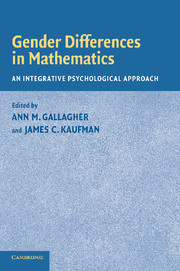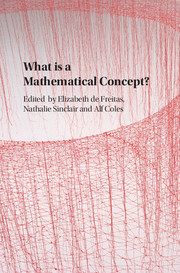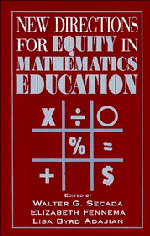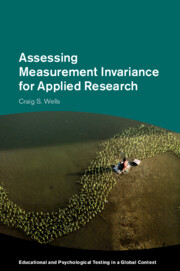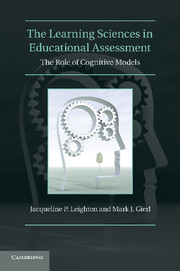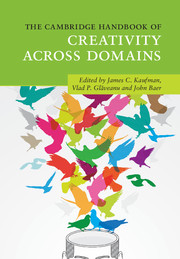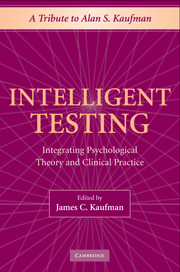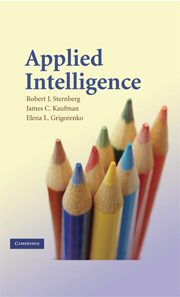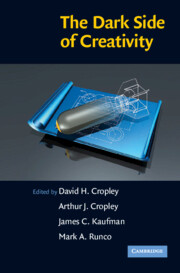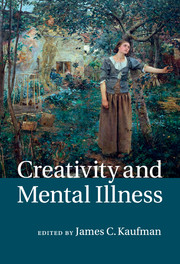Gender Differences in Mathematics
An Integrative Psychological Approach
$48.99 USD
- Editors:
- Ann M. Gallagher, Law School Admissions Council, Newton, PA
- James C. Kaufman, California State University, San Bernardino
- Date Published: August 2006
- availability: This ISBN is for an eBook version which is distributed on our behalf by a third party.
- format: Adobe eBook Reader
- isbn: 9780511222825
Find out more about Cambridge eBooks
$
48.99 USD
Adobe eBook Reader
Other available formats:
Hardback, Paperback
Looking for an inspection copy?
This title is not currently available on inspection
-
Females consistently score lower than males on standardized tests of mathematics - yet no such differences exist in the classroom. These differences are not trivial, nor are they insignificant. Test scores help determine entrance to college and graduate school and therefore, by extension, a person's job and future success. If females receive lower test scores then they also receive fewer opportunities. Why does this discrepancy exist? This book presents a series of papers that address these issues by integrating the latest research findings and theories. Authors such as Diane Halpern, Jacquelynne Eccles, Beth Casey, Ronald Nuttal, James Byrnes, and Frank Pajares tackle these questions from a variety of perspectives. Many different branches of psychology are represented, including cognitive, social, personality/self-oriented, and psychobiological. The editors then present an integrative chapter that discusses the ideas presented and other areas that the field should explore.
Read more- Multiple perspectives of up-to-date and cutting-edge research and theory
- Top notch group of experts, many with expertise in psychology, teaching and with standardized testing
- Integrative final chapter that highlights what we know and what we need to know
Reviews & endorsements
'Here is an intense, interesting book. It is provocative, stimulating and frustrating.' Psychologist
Customer reviews
17th Oct 2024 by UName-327697
this book is helpful in my research about the gender difference in mathematics performance of students
Review was not posted due to profanity
×Product details
- Date Published: August 2006
- format: Adobe eBook Reader
- isbn: 9780511222825
- contains: 17 b/w illus. 11 tables
- availability: This ISBN is for an eBook version which is distributed on our behalf by a third party.
Table of Contents
Preface
1. Research on the women and mathematics issue: a personal case history Susan Chipman
2. The perseverative search for sex differences in mathematic ability Paula Caplan and Jeremy Caplan
3. A psychobiosocial model: why females are sometimes > and sometimes < males in math achievement Diane Halpern, Jonathan Wai and Amanda Saw
4. Gender differences in math: cognitive processes in an expanded framework James Byrnes
5. Cognitive contributions to sex differences in math performance James M. Royer and Laura M. Garofoli
6. Spatial ability as a mediator of gender differences on mathematics tests: a biological-environmental framework M. Beth Casey, Ronald Nuttal and Elizabeth Pezaris
7. Examining gender-related differential item functioning using insights from psychometric and multicontext theory Rob Ibarra
8. The gender-gap artifact: women's underperformance in quantitative domains through the lens of stereotype threat Paul Davies and Steve Spencer
9. 'Math is hard!' (Barbie, 1994): responses of threat vs challenge mediated arousal of stereotypes alleging intellectual inferiority Talia Ben Zee, Cristina M. Carrasquillo, Alison M. L. Ching, Tattiya J. Kliengklom, Kristen L. McDonald, Daniel C. Newhall, Gillian E. Patton, Tiffany D. Stewart, Tonya Stoddard, Michael Inzlicht and Steve Fein
10. The role of ethnicity on the gender gap in mathematics Alyssa Walters and Lisa Brown
11. The gender gap in mathematics: merely a step function Sophia Catsambis
12. 'I can, but I don't want to': the impact of parents, interests, and activities on gender differences in math Janis E. Jacobs, Pamela Davis-Kean, Martha Bleeker, Jacquelynne S. Eccles and Oksana Malachuk
13. Gender effects on mathematics achievement: mediating role of state and trait self-regulation Eunsook Hong, Harold O'Neil and David Feldon
14. Gender differences in mathematics self efficacy beliefs Frank Pajares
15. Integrative conclusion Ann Gallagher and James Kaufman.
Sorry, this resource is locked
Please register or sign in to request access. If you are having problems accessing these resources please email [email protected]
Register Sign in» Proceed
You are now leaving the Cambridge University Press website. Your eBook purchase and download will be completed by our partner www.ebooks.com. Please see the permission section of the www.ebooks.com catalogue page for details of the print & copy limits on our eBooks.
Continue ×Are you sure you want to delete your account?
This cannot be undone.
Thank you for your feedback which will help us improve our service.
If you requested a response, we will make sure to get back to you shortly.
×
